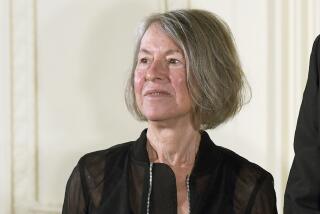Book Review : A Too-Prosaic Look at the Private Lives of Poets
- Share via
Modern American Women Poets by Jean Gould (Dodd, Mead: $17.95, illustrated)
This good-natured, maddening book purports to be a collection of brief biographies of some of this century’s most interesting women writers. Included are Muriel Rukeyser, Audre Lorde, Adrienne Rich, Gwendolyn Brooks, Isabelle Gardner, Denise Levertov, Marge Piercy--a total of 17 women, all distinguished, some (like Elizabeth Bishop) notoriously private.
Who can resist a little biography of a famous poet? Poets almost always have interesting private lives. Their financial circumstances are typically so precarious that they are drawn into many kinds of jobs. Their social positions are so marginal that they often align themselves with extreme political positions, acquiring dramatic historical interest as a result. Their psyches are so permeable that they risk emotional bonds the rest of us can hardly entertain in fantasy.
When out of work, out of luck, out of love, they travel. A book that promises 17 such little biographies ought to be by definition a book worth reading.
Fraught With Problems
Florence Gould’s earlier book “American Women Poets” (1980), is just such a book, which condenses and restyles some very interesting and on the whole reliable stories drawn from older biographies. The present book, “Modern American Women Poets,” is howlingly amateurish. Writing about living or recently dead persons provides problems for a biographer that Gould has not been able--does not seem to have tried--to surmount with research. For one thing, living poets (or their living relatives) may hope to live down some of the more interesting episodes in their histories. Even if the poet does not seek privacy, it may be expensive and inconvenient for the biographer to track down the poet and her friends for interviews. Finally, the interest and social importance of the poet’s work may be shifting out from under the biographer even as the biography is going to press.
Given the difficulties of such research, it is easy to understand why Gould has avoided it. Instead, she has culled biographical material from two sources: published reviews and interviews, and the poems themselves. Thus Gould says nothing that has not previously appeared in print; but she also accepts as fact about the poet whatever has been said about “I” in the poetry. Mistakes and misconceptions creep into the story as Gould tries to piece together a chronological account from evidence in poems; some of the silliest errors are not very hard to identify, if you know anything at all about the poet’s life. (Gould’s portrait of Anne Sexton’s happy marriage, for example, is based on details from poems Sexton wrote to lovers.)
The same procedure that falsifies information gives a slick sentimentality to the tone of Gould’s book. Into the commonplaces of the chatty narrative dart episodes of startling intimacy as Gould switches her sources from prose to poem; yet the writing has a prudish quality too, as when Gould chides Adrienne Rich for using a four-letter word in one of her poems, or finds “unwarranted” Sylvia Plath’s line, “Every woman adores a Fascist” (from “Daddy”). It seems too bad that the most valuable pages in the book are the black-and-white photo portraits by Layle Silbert.
More to Read
Sign up for our Book Club newsletter
Get the latest news, events and more from the Los Angeles Times Book Club, and help us get L.A. reading and talking.
You may occasionally receive promotional content from the Los Angeles Times.







